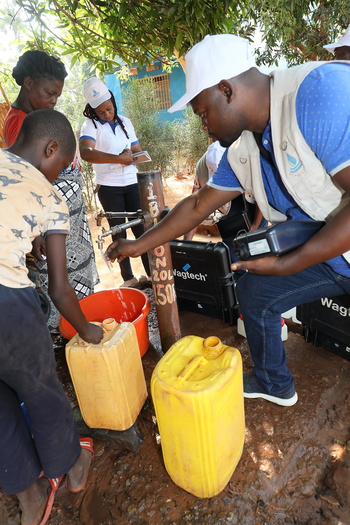Improving water supply in the Democratic Republic of the Congo
Strengthening the efficiency of drinking water services
-
Commissioning Party
German Federal Ministry for Economic Cooperation and Development (BMZ), United States Agency for International Development (USAID)
-
Cofinancier
USAID
-
Country
-
Lead executing agency
More
-
Overall term
2022 to 2024
-
Other Stakeholders
Ministry of Water Resources and Electricity (MRHE) and the Water Distribution Company of the Democratic Republic of the Congo (REGIDESO)
-
Products and expertise
Sustainable infrastructure: water, energy, transport

Context
Only 24 per cent of people in the Democratic Republic of the Congo have access to affordable drinking water. The rural population and women are among the most disadvantaged groups.
Objective
The institutional structures required for high-quality urban water supplies have improved. They are geared to the needs of the population and promote equality for women.
Approach
The project supports the REGIDESO, a state-owned commercial company that provides clean drinking water to the population. It is working with the company’s head of human resources to optimise work processes. It also advises local governments to enable them to improve their services for people in the regions. The project contributes in particular to making the provincial directorate of REGIDESO in Mbuji-Mayi financially and operationally autonomous.
In the provinces of Kasai Oriental, Kwilu, Lomami, South Ubangi, North Kivu and South Kivu, the project is promoting the establishment and operation of subnational authorities. These authorities are technical service agencies that assume the role of developer on behalf of the respective province for the implementation of water supply projects.
The project also works with the relevant national ministry in the Democratic Republic of the Congo to enable it to structure its knowledge base and share lessons learned about decentralised water supply. It also supports the establishment of a national regulatory authority for public water supplies.
Last update: August 2023







